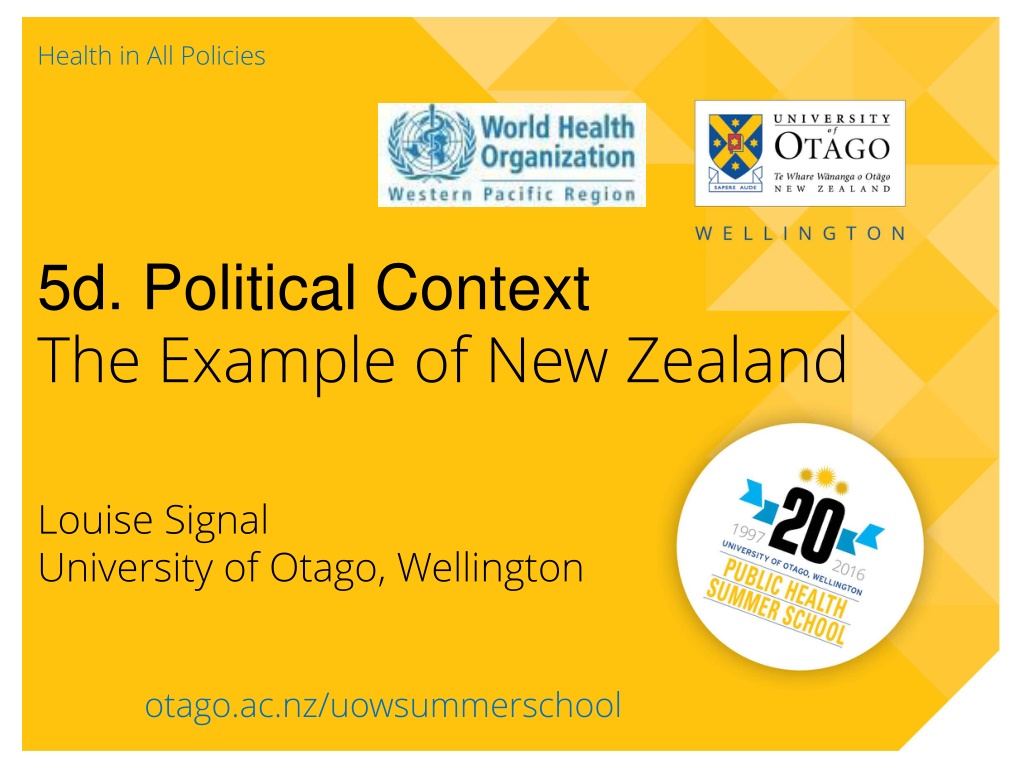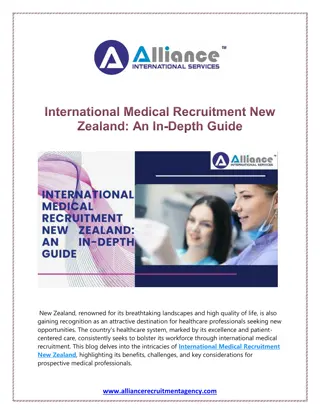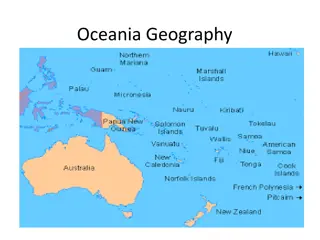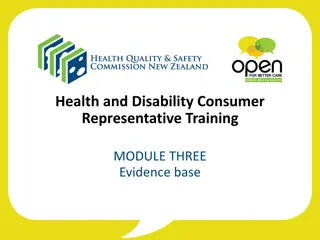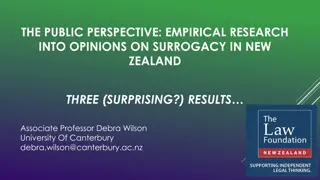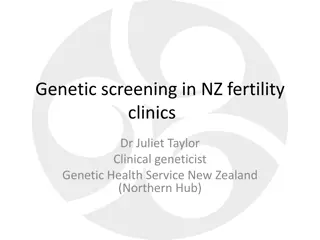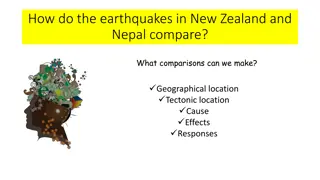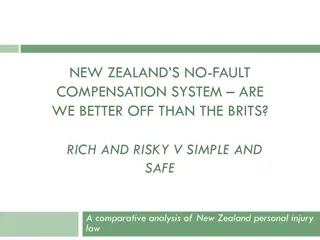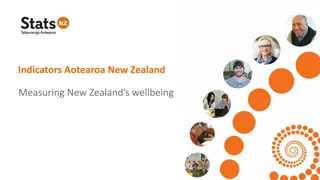Understanding the Political Context of Public Health in New Zealand
This paper delves into the political landscape of public health in New Zealand, emphasizing the importance of analyzing political influences to enhance public health initiatives. It explores various theories such as Interest Group Theory, Institutional Theory, and Theory of Political Economy to understand the complexities of public health policymaking. The discussion also highlights the role of interests, including ethnic considerations, and the significance of NGOs in advocating for health determinants.
Download Presentation

Please find below an Image/Link to download the presentation.
The content on the website is provided AS IS for your information and personal use only. It may not be sold, licensed, or shared on other websites without obtaining consent from the author. Download presentation by click this link. If you encounter any issues during the download, it is possible that the publisher has removed the file from their server.
E N D
Presentation Transcript
Health in All Policies 5d. Political Context The Example of New Zealand Louise Signal University of Otago, Wellington otago.ac.nz/uowsummerschool
Aim of the lecture This paper examines: the politics of health using the example of New Zealand & considers ways of analysing political and other contextual influences to strengthen public health action.
Why focus on politics? Public Health is inherently political - Enabling people to increase control over & improve their health (WHO) - Committed to equity requires shifts in power & resources - Broad definition of health & focuses on determinants of health involves public health in all sectors of society & at all levels - Largely funded by government developed world.
Political Theory: What questions does it suggest? Interest Group Theory: who are the interests, how are they organised & resourced, what strategies are they using? Institutional Theory: what are the institutions, how are they structured, how do they operate, what are their ideas & values, & how do individuals within institutions interprete these elements? Theory of political economy: what is the macro political & economic discourse, what is the view of the market & the role of government, how are the interests of the people balanced with the need for economic growth, & how do macro institutions & political decisions reflect this discourse?
Interests Represent sections of society or are issue-based and some are better heard than others. Key sectional distinction is ethnicity. Much debate about the presence & nature of a dominant NZ European or P keh culture. Mulgan (2004, p. 31) states it is unseen because it is so all pervading." there is no P keh health lobby as P keh , or at least European New Zealanders, can rely on the mainstream . . . to address their concerns (Mulgan 2004).
NGOs Proportionally NZ has one of the largest non- profit sectors in the world, 97,000 community groups (Statistics NZ, 2007). Hermanson s (2011) research on NZ social service NGOs demonstrates the critical role they play in advocacy on the determinants of health.
Media In recent years the media in NZ has become a less effective voice for robust debate, an essential tenant of democracy. Due in part to the commercialisation of the media, its increasingly tabloid nature, & its ownership by a handful of multinational media barons. Resulted in mainstream news reportage [that] amplifies the symptoms rather than the causes , inconsistent with determinants of health & the causes of the cause (Hope 2001).
Issue-based groups Business issues occupy a privileged position in NZ, "interest groups which represent . . . key economic forces can always expect to receive a serious hearing from NZ governments anxious to encourage business confidence (Mulgan, 2004 page 230). Since the 1980s governments have contributed to an erosion of democracy in NZ by failing to play the role of broker between interests & defending weaker interests (Mulgan 2004).
Institutions The Wellington variant of the Westminster system (Martin & Salmond, 2001) Single-chamber, cabinet-dominated Parliament. Free of checks & balances natural to other political systems Gauld ( 2003). The political culture is largely adversarial. 3-year electoral cycle facilitates fast law & hasty policy change (Gauld).
MMP Changed the nature of Parliament moving from 2 parties to 7. More representative, including more women, M ori, Pacific & Asian MPs. Better reflects the views of voters than FFP. More flexibility in policy-making. - coalition agreements that have given increasing freedom to the minor partners to pursue their own political agendas (Boston & Bullock 2009). In my view it has resulted in a more negotiated & participatory policy-process. Provided a check in an otherwise unchecked system.
Key features of public service In late 80s & 90s NZ introduced "probably the most comprehensive & radical set of public management reforms of any OECD country" (Pollitt 2004, 280). Key features of the NZ model include: - the strong influence of neo-liberal economic theory; - the application of a contractual model; - decentralisation of control, the separation of policy advice from operations; & the treatment of management as a generic skill-set (Chapman & Duncan 2007).
Key features of public service Inherent conflict in policy advice between the obligation to speak truth to power & to be responsive to the Minister (Martin & Salmond 2001 p.56). Public servants tailor their advice to what they think the Minister wishes to hear rather than giving their best professional advice.
Political Economy: Neo- liberalism It prescribes a reduced role for the state, focuses on economic policies that encourage the expansion of competitive free markets, & those that are conducive to the business environment, such as low taxes. Advocates of neoliberalism argue for the privatisation of all but the most essential state institutions (including health, welfare & corrections) to foster free-market competition which is equated with efficiency (Gabrielle Jenkin, 2010). Neo-liberalism has dominated NZ policy making from 1984.
Political Economy: Social Democracy Social democracy proposes a board balance between the market economy, on the one hand, and state intervention, on the other (Heywood 2003, 129). It accepts capitalism as the only reliable means of generating wealth but views capitalism as associated with structural inequality & poverty, factors that can be addressed by the state as custodian of the public interest (Heywood, 2003).
Political Economy: Where is NZ? NZ political spectrum has moved to be placed in centrist position between neo-liberalism and social democracy with major parties not too far from this middle line & relatively close together (Gauld 2009). In NZ arguing over the balance between neo- liberalism & social democracy.
Political Economy & Action to Address Health Inequalities Navarro and Shi s (2001) empirical analysis of the effect of political context on inequalities & health including analysis of OECD data 1945-1980. Found countries with strong labour movements and social democratic governments have generally been "the most committed to redistributive policies, contributing to better health indicators such as lower infant mortality rates than those with weaker labour movements and liberal or Christian democratic governments (p. 490). Suggests for those wishing to optimize the health of populations by reducing social and income inequalities, it seems advisable to support political forces such as the labor movement and social democratic parties which have traditionally supported larger, more redistributive policies that have liberal parties (p. 490).
Implications for Public Health in NZ Range of interests and some not heard well. Public Health has a role in enabling the silenced to be heard. Ethnicity is a key aspect of interests in NZ and critical in Public Health with commitment to equity. Social Service NGOs play a critical role in advocacy on the determinants of health. Some are public health and others are key allies. Know who they are. The media is a key player but it is difficult to get them to focus on the causes rather than the symptons. We need to find innovative ways to do this. Business has a privileged position in NZ which provides a challenge for public health action trying to limit the influence of industries such as tobacco, alcohol and food. How can we get a more level playing field?
Implications for Public Health in NZ We have a short political term, very few checks & balances in our political institutions that results in hasty policy change . Change is possible. MMP provides increased democracy and should be retained. Our public service is constrained by neo-liberal ideology and responsiveness to the Minister. The best public health advice is therefore not always provided. Role for academics & civil society. NZ is arguing over the balance between neo-liberal and social democratic policy. Public Health and addressing the determinants of health are consistent with social democracy. It is policy in this direction we should be arguing for.
Implications for Public Health To be effective, public health practitioners & researchers need a strong political awareness. We need to know: - our allies & adversaries, - the institutions we are working with, & - the context in which we are working. This will enable more effective public health action in the future.
Conclusion Conceiving politically neutral policy improvements for better public health outcomes & reduced social health inequalities is a fiction we need to come to terms with Bernier & Clavier (2011 p 114).
